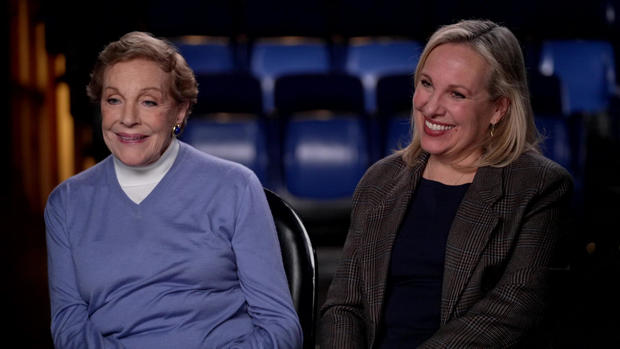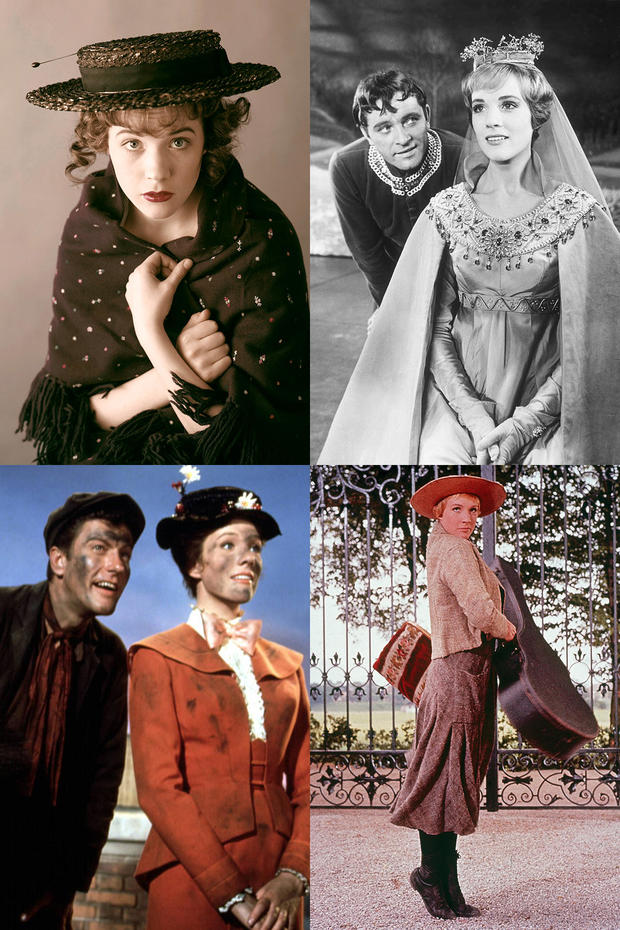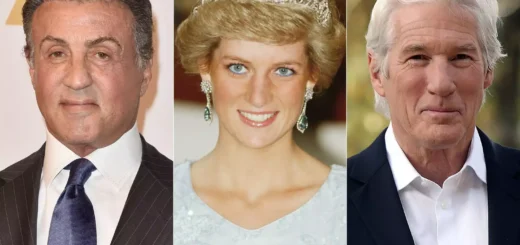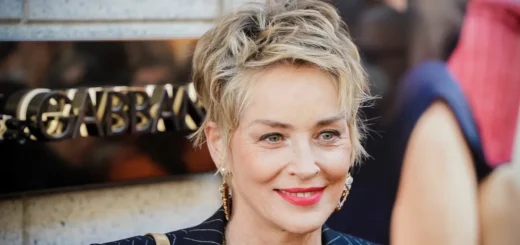Julie Andrews on finding her voice again, as a children’s book author
“Mary Poppins” was Julie Andrews’ first film. Her second film was “The Sound of Music.” If she had never made another movie, she might still be one of Hollywood’s most endearing and beloved stars … and generation after generation would still be singing along.
Though that was just the beginning of a career literally in its eighth decade, it’s a very good place to start. Because now, Julie Andrews is a writer of children’s books, with co-author, and daughter, Emma Walton Hamilton. Their latest is a story of the theater from the perspective of … a duck.
And it’s a true story! Hamilton said, “Some years ago, here at Bay Street Theatre in Sag Harbor, we happened to notice that a pair of ducks were nesting in a planter in our courtyard out front.”
“And of course, our ducks in the book are theatrical ducks, very much so,” said Andrews. “They hear music.” And Mr. Puddle Duck sneaks into the theater…
“Waiting in the Wings” is the 35th book by this prolific partnership, a collaboration that has given Andrews a new voice. Thirty years ago, a surgical procedure went horribly wrong, destroyed her famous soprano, and took her identity. “One day I was bemoaning my fate and missing very much the fact that I couldn’t sing, because the surgery went awry and it took away my ability to do what I love to do,” Andrews said. “And so, I was bemoaning my fate to Emma, and she said, ‘Oh, Mum, you’ve just found another way of sharing your voice.’ And I tell you, it hit me so hard what she said. And I’ve never really bemoaned it since.”
Sounding a lot like a younger Julie Andrews, who as Maria said, “When the Lord closes a door, somewhere he opens a window.”
And there are some other intriguing parallels: “Both Maria and Mary Poppins must win over skeptical children,” said Pauley. “They are all about fun, but not all about fun. They are sly teachers. They are optimists. But they recognize that children have real problems.”
“We don’t talk down to kids,” said Andrews. “We try to bring them up so that you don’t condescend in any way.”
She’s loved books since she was a child. Born in 1935, her childhood memories include air raid sirens and running for cover during the Blitz, the German bombing of London in World War II. Her parents had already split up. It was her stepfather who discovered her voice – a nine-year-old soprano with an astonishing four-octave range. “Little Julie” became part of her parents’ musical act on the vaudeville circuit.
Before long, she was supporting the family, paying the family mortgage while still a teenager. “Well, we needed cash dreadfully,” Andrews said. “So eventually, when I was about 15, I went out on my own all around England, ’round and around and around.”
“But with the responsibility that your family needed a roof over their head and it was your job to do it?” asked Pauley.
“Well, I was part of the family trying to do it,” she replied. “But eventually, it was just me, because my stepfather was an alcoholic, sadly.”
But she said at that young age she was not, despite her training, reaching for the stars. “No, in fact, doubting that I ever would,” Andrews said. “I mean, I was doing it because it helped and I had to. In my teens, I would think, ‘What is all this for? Where is it going to lead?’ And then, suddenly, the world broke open.”
At 19, she was cast as the lead in a Broadway show, Sandy Wilson’s “The Boy Friend.” She was a 10-year veteran of the stage and a trained vocalist, but she was not quite ready. “I didn’t have acting lessons or anything like that,” she said. “I picked it up and learned, and people are very kind. You know, they don’t hurt puppies, actually, if you know what I’m saying! And I was a puppy, and I didn’t know what the heck I was doing. But I learned and was grateful for all of the teaching that I got.”
Still a newcomer, at 20 she created the role of Eliza Doolittle opposite veteran Rex Harrison in Lerner & Loewe’s 1956 smash hit, “My Fair Lady.” The following year, she starred in a CBS production of Rodgers & Hammerstein’s “Cinderella” on television. One hundred million Americans saw Andrews for the first time.
In 1960 she was Guenevere to Richard Burton’s King Arthur in “Camelot.” But when Walt Disney was in the audience one night, he saw his Mary Poppins. It was an Academy Award-winning performance in her very first motion picture.
Andrews still radiates grace, and gratitude, but in the very British tradition of “getting on with things.” “I just feel most of my life that I’ve been so very, very fortunate to have the identity of a singing voice, to have the opportunities to learn about how to be on stage or film or whatever,” she said.
Hamilton added, “You were very fortunate, and you were also very unfortunate in some ways – growing up in the war with alcoholic parents and being put to work at a very young age and being, essentially, robbed of a childhood.”
“Feeling needed and vital and valuable, too, yeah,” said Andrews.
Hamilton noted that her mother’s mantra has always been, Are we lucky or what? “I think whether or not it’s true, it is the thing that got you through,” Hamilton said.
Pauley said, “When Maria in ‘The Sound of Music,’ as she’s falling in love and he’s in love, she sings the song that includes a line, ‘Somewhere in my youth and childhood, I must have done something good.'”
“Well, somebody must have, ’cause I got so damn fortunate,” Andrews laughed. “Are we lucky …?”
“… or what?” laughed Hamilton.




